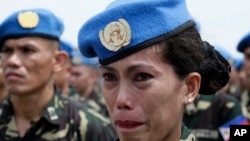Sunday was the annual International Day of U.N. Peacekeepers, honoring the more than 1 Million men and women recognized around the world as "Blue Helmets."
U.N. Secretary-General Ban Ki-moon said the Blue Helmets "manifest the best attributes of global solidarity, courageously serving in dangerous environments to provide security to some of the world's most vulnerable."
Earlier this month, Ban laid a wreath outside U.N. headquarters in New York in memory of the 3,400 peacekeepers who have lost their lives since the first mission in 1948.
U.N. officials say that in the past year, peacekeeping missions have faced many challenges, including sheltering 200,000 civilians in South Sudan fleeing for their lives to U.N. bases, and a peacekeeping team helping the Central African Republic carry out a successful presidential election.
Along with peacekeeping, the Blue Helmets also deal with the problem of landmines and the leftover remnants of war that have the potential of killing or severely wounding thousands of civilians.
Secretary of State John Kerry marked the day with a statement reinforcing the U.S. commitment to what he called the "indispensable role" of U.N. peacekeepers. He also said the U.S. is deeply concerned by sexual abuse by some peacekeepers, saying such incidents only tarnish the accomplishments of the Blue Helmets who serve with distinction.
The first U.N. peacekeeping mission was deployed in 1948 to monitor a truce between Israel and its Arab neighbors.
That mission, called the U.N. Truce Supervision Organization, is still ongoing.




